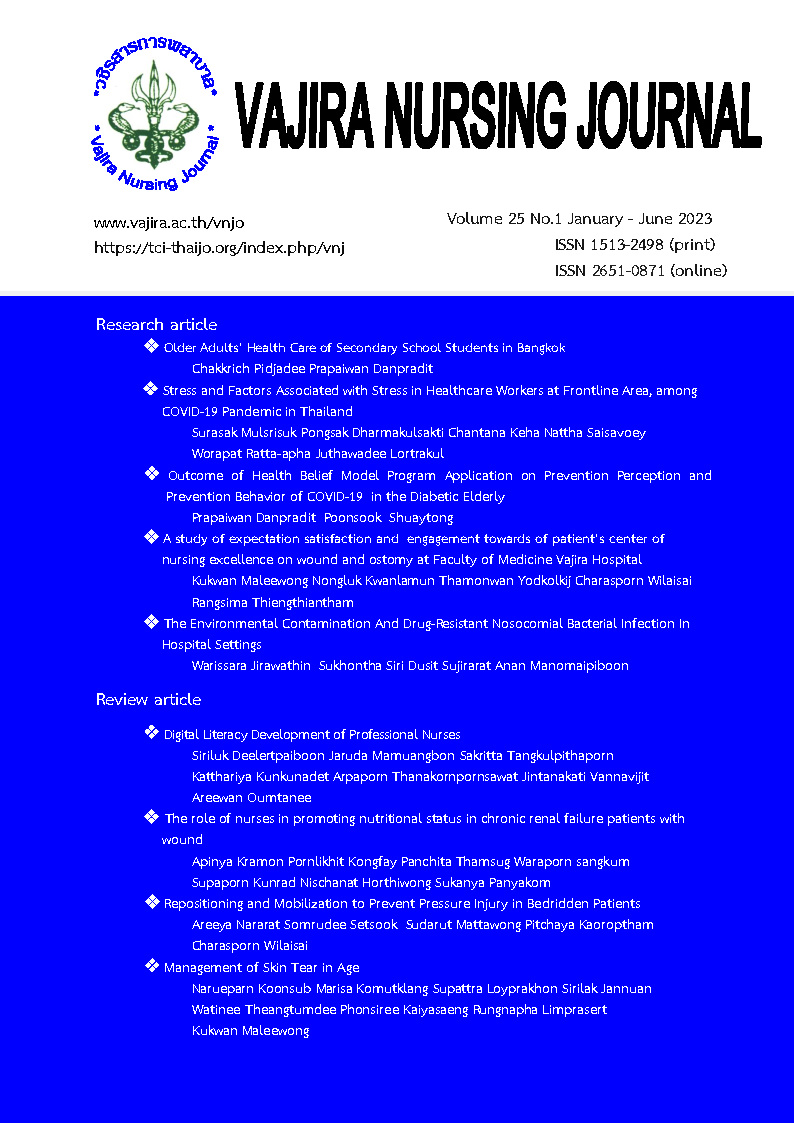ผลของโปรแกรมการประยุกต์ใช้แบบแผนความเชื่อด้านสุขภาพ ต่อการรับรู้และพฤติกรรมการป้องกันโรคโควิด-19 ผู้สูงอายุเบาหวาน
Main Article Content
บทคัดย่อ
การวิจัยครั้งนี้เป็นงานวิจัยแบบชนิดกลุ่มเดียว วัดก่อนและหลังการทดลอง เพื่อเปรียบเทียบคะแนนการรับรู้การป้องกันโรคโควิด-19 และพฤติกรรมการป้องกันโรคโควิด-19 ผู้สูงอายุเบาหวานก่อนและหลังเข้าร่วมโปรแกรมการประยุกต์ใช้แบบแผนความเชื่อด้านสุขภาพ กลุ่มตัวอย่าง คือ ผู้สูงอายุ
ที่มีประวัติเป็นโรคเบาหวาน ในชมรมผู้สูงอายุวัดปุรณาวาส กรุงเทพมหานคร เลือกแบบเจาะจง จำนวน 30 คน เครื่องมือวิจัย คือ 1) โปรแกรมการประยุกต์ใช้แบบแผนความเชื่อด้านสุขภาพ 2) แบบสอบถามข้อมูลส่วนบุคคล 3) แบบสอบถามการรับรู้การป้องกันโรคโควิด-19 4) แบบสอบถามพฤติกรรมการป้องกันโรคโควิด-19 กลุ่มตัวอย่าง เข้าร่วมโปรแกรมจำนวน 15 ชั่วโมง (5 วัน) เก็บรวบรวมด้วยแบบสอบถาม วิเคราะห์ข้อมูลด้วยค่าเฉลี่ย ค่าเบี่ยงเบนมาตรฐาน และ paired t-test
ผลการวิจัย พบว่า กลุ่มตัวอย่าง ก่อนเข้าร่วมโปรแกรมมีคะแนนการรับรู้การป้องกันโรคโควิด-19 ในระดับดีหลังเข้าร่วมโปรแกรมมีคะแนนการรับรู้การป้องกันโรคโควิด-19 ในระดับดีมากและดีกว่าก่อนเข้าร่วมโปรแกรมอย่างมีนัยสำคัญทางสถิติที่ระดับ 0.01 และผลการวิจัยพฤติกรรมการป้องกันโรคโควิด-19 ก่อนเข้าร่วมโปรแกรมมีพฤติกรรมการป้องกันโรคโควิด-19 ในระดับดีมาก หลังเข้าร่วมโปรแกรมมีพฤติกรรมการป้องกันโรคโควิด-19 ในระดับดีมากและดีกว่าก่อนเข้าร่วมโปรแกรมอย่างมีนัยสำคัญทางสถิติที่ระดับ 0.01
สรุป โปรแกรมการประยุกต์ใช้แบบแผนความเชื่อด้านสุขภาพต่อการรับรู้การป้องกันโรคโควิด-19 และพฤติกรรมการป้องกันโรคโควิด-19 เป็นโปรแกรมที่มีประสิทธิภาพ สำหรับทีมสุขภาพ สามารถนำรูปแบบการวิจัยไปส่งเสริมความรู้เพื่อป้องกันโรคโควิด-19 กับผู้สูงอายุเบาหวานและกลุ่มเสี่ยงอื่น ๆ ได้
Article Details

อนุญาตภายใต้เงื่อนไข Creative Commons Attribution-NonCommercial-NoDerivatives 4.0 International License.
เนื้อหาและข้อมูลในบทความที่ลงตีพิมพ์ในวชิรสารการพยาบาลถือเป็นข้อคิดเห็นและความรับผิดชอบของผู้เขียนบทความโดยตรง ซึ่งกองบรรณาธิการไม่จำเป็นต้องเห็นด้วย หรือร่วมรับผิดชอบใด ๆ ทั้งสิ้น
บทความ ข้อมูล เนื้อหา รูปภาพ ฯลฯ ที่ได้รับการตีพิมพ์ในวชิรสารการพยาบาล ถือเป็นลิขสิทธิ์ของวชิรสารการพยาบาล หากบุคคลใดหรือหน่วยงานใดต้องการนำทั้งหมดหรือส่วนหนึ่งส่วนใดไปเผยแพร่ต่อหรือเพื่อกระทำการใด ๆ จะต้องได้รับอนุญาตเป็นลายลักอักษรจากวชิรสารการพยาบาลก่อนเท่านั้น
เอกสารอ้างอิง
Division of General Communicable Diseases. Guidelines for control, prevention and surveillance of COVID-19 for medical and public health personnel. Department of Disease Control, Ministry of Public Health; 2021.p1-4,31. [internet]. 2021 [cited 2021 Jan 21]Available from: https:// ddc.moph.go.th/uploads/publish/ 1150920210610033910.pdf.
Sirinawin S. "Covid-19" knowledge to wisdom, practice development. Faculty of Medicine Ramathibodi Hospital, Mahidol University. Bangkok: O.S. Printing House Company Limited; 2020. p.11-23. (in Thai)
Bureau Of Epidemiology. COVID-19 Situation Review Report and Global preventive measures and in Thailand. Division of Non-Communicable Diseases, Department of Disease Control, November 2021. Ministry of Public Health. [internet]. 2021 [cited 2021 October 21]. Available from: http://www.thaincd.com/document/file/ download/knowledge/COVID19.65.pdf.
Department of Disease Control. Report an emergency situation case of COVID-19 Coronavirus 2019. p.3. Data as of 15 August 2021. Ministry of Public Health. [Internet]. 2021 [cited 2022 Jan 11]. Availablefrom: https://ddc.moph.go.th/viralpneumonia/file/situation/situation-no590-150864.pdf.
Center for Covid-19. Situation Administration. Report of the Covid-19 Situation in Thailand, Data as of 15 May 2021. Department of Disease Control,Ministry of Public Health; 2021.p.7. [internet]. 2021 [cited 2021 June 13]. Available from: https://media. thaigov. go.th/ uploads/ public_img/source/ 150564.pdf.
Department of Disease Control. Guidelines for the prevention of COVID-19 for general Public and risk groups . Ministry of Public Health (3 January 2021) [internet]. 2021 [cited 2021 April 21]. Available from: https://ddc.moph.go.th/viralpneumonia/file/int_protection/ int_protection _030164.pdf.
Vichaivej Hospital International Nong Khaem. Why are people with chronic diseases athigh risk?. [internet]. 2021 [cited 2021 April 21]. Available from: https://vichaivej-nongkhaem.com/health-info/7 กลุ่มโรครับวัคซีนโควิด/
Hirunpanich Sato V. Diabetes and Coronavirus Disease 2019 (COVID-19). Department of Pharmacology, Faculty of Pharmacy, Mahidol University, Thailand. [internet]. 2021[cited 2021 January 19]. Available from: https://pharmacy.mahidol.ac.th/ knowledge/files/ 0561.pdf.
Moolnangdeaw R. Factors Related to Promoting Health Service to Elderly at Public Health Center 67 Thawiwatthana, Department of Health, Bangkok Metropolitan Administration. ROMPHRUEK JOURNA: KRIRK NIVERSITY 2015; 33(3): 97-114. (in Thai)
Ngamkham S, Suwannapong N, Tipayamongkholgul M, Manmee J. Access to Health Care Services of the Elderly,Thawiwatthana District, Bangkok. Kuakarun Journal of Nursing 2018; 25(2): 91-104. (in Thai)
Punthasee P, Srisawad K .Correlations between Health Belief and 3E 2S Health Behaviors of Elderly in Taejew Community Tungwatdorn Sathorn Bangkok Thailand. Journal of Health and Health Management 2020; 6(1): 45-56. (in Thai)
Kespichayawattana J, Wivatvanit S, Whanwaja C. Health literacy of the Elderly in the Elderly club, Bangkok. Journal of Demography 2020; 36 (2): 37-52. DOI: 10.14456/jod. 2020.3. (in Thai)
Center for Covid-19. Situation Administration. Report of the Covid-19 Situation in Thailand, Data as of 31 March 2021. Department of Disease Control, Ministry of Public Health. [internet]. 2021 [cited 2021 April 21]. Available from: https://media.thaigov. go.th/ uploads/public_img/source/310364.pdf.
Becker MH, Maiman LA. Health Belief Model and Sick Role Behavior. Health Education Monograph 1974; 2: 409-17.
Faul F, Erdfelder E, Lang AG, Buchner A. G*Power 3: a flexible statistical power analysis program for the social, behavioral, and biomedical sciences. Behav Res Methods 2007; 39(2): 175-191.
Mohthong S. An Application of Participatory Knowledge Management Program for Coronaviruses (COVID-19) Prevention and Control of Community Organization In Muang District, Surin Province. Journal of Public Health and Innovation 2021; 1(1): 24-36. (in Thai)


